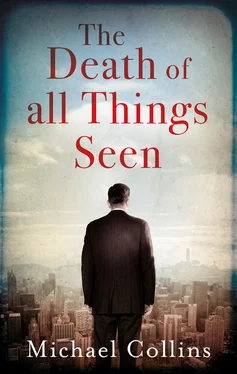Guilt jumped in him like a live wire. In truth, he had come to see his relationship with Grace as akin to the sort of chasm that opened in those awful castaway plays that went nowhere — ideas and plot lines that existed at the liminal horizon of something conjured but never made quite real. The play that never formed, not so much for a lack of will, but because of a failure of the imagination to sustain the mundane, the ordinary, to buoy existence in the float of sorting through the infinite possibility of what a minute, an hour, or a day might hold, then aligning it with a guiding foreknowledge of where it might lead and eventually end.
It struck him how he had so failed in the imaginative reach of conceiving a life with Grace, so there was no ordination of what might be accomplished or what was to come, no foresight of even the landmark moments — her first day of school, her first date, her graduation, or eventual marriage, nothing.
Norman stared at morning light caught in the small, paned windows of Grace’s dollhouse. Within, he could see the porcelain figurines — the miniature proprietor, George Crumby, respectable banker, enjoying an eternal breakfast with wife Esther, son Harold, and daughter Polly; a proper Victorian family seated in a second-floor, wallpapered room with a white tablecloth, overhanging chandelier, and portrait of the queen on the wall.
It was so self-contained, so real that it was easy to conjure up a life lived inside the dollhouse, this world fashioned and conceived in a time before two world wars and the collapse of the British Empire, in a time before the slow leech of civility, good manners and proper dress.
Norman had the relevant history, the facts, the apparent mood of crusty manners, the staid voice of George Crumby — authoritatively clipped, sensible, George Crumby speaking over the rasp of a knife in the spread of butter on toast, with a measure of rebuke, reprimand or instruction. He felt he could begin right now with a play of sensibility and manners, and yet, in standing there, it fell on him, the revelation of what was far more difficult to capture — the in-between time of the great mansions and what came after George Crumby and his family — the subtle shift when a time was no longer as it had been. It took a keen insight to understand that what was felt was not the thing itself, but its after-effect. Though, somewhere in the in-between of in-betweens, he felt that an understanding could sometimes register — and just barely — if one had the acuity to feel it. This is where greatness lay.
In looking in at George Crumby, in seeing the small black umbrella stand, Norman was reminded of the depth of Lennon and McCartney’s lament for the passing of an older England; their transformation from clean cut pop stars to the strung-out, long-haired gurus of an Eastern mysticism. How had they navigated from the perfunctory vacuity of ‘She Loves You Yeah Yeah Yeah’, ‘It’s Been a Hard Day’s Night’ and ‘I Want to Hold Your Hand’, to the melancholic dirge of childhood memories of standing in the English rain? And so, too, capturing the inexplicable litany of those most English of moments in ‘Penny Lane’ where a pretty nurse sold poppies from a tray, to the dirge of ‘Eleanor Rigby’ in the church where a wedding had been, all of it a slurred past seen through a yellow matter custard dripping from a dead dog’s eye.
Norman recalled a naked John and Yoko in the bed-in protests in a world come undone by Vietnam, John and Yoko a contrite Adam and Eve reckoning with the grim reality of what the snake had so offered in the Garden of Eden.
Norman looked away, felt a shudder run through him. He opened his phone, scrolled through some photos. He settled on a shot of Grace. Both her hands were earnestly fixed on the steering wheel of a miniature ice-cream truck.
He scrolled to another image of her. How strange to mark time against physical change in the way a child grows with the passage of weeks and months. He could see with the distance of three years how exotically Oriental she had looked upon arrival, her large doll face, her body so shockingly tiny.
Grace had suffered apparent malnutrition, or that was the determination of a doctor who had cautioned that, most probably, her adult teeth, when they came in, would need dental work. She was missing an enamel coating on her baby teeth. It was advised she not eat processed sugars. Her bones, too, had been deprived of calcium. She was suffering rickets. There were things that happened during her lack of prenatal care that might yet manifest. Norman learned all this stateside.
Norman navigated to an image of the orphanage in the southern region of the Guangxi province, a province, until then, unknown to him and not disclosed before he left America. There had been that much secrecy in the adoption.
The house warden was a small, withered peasant dressed in Maoist style standing outside a dilapidated government building that had served as a place for indoctrination during the Cultural Revolution. Against the dark background, he could see a constellation of lights, the eyes of the children caught in the camera flash.
*
When Joanne came back inside, she announced, ‘I can give a month’s notice if you like.’
Norman rallied. ‘I just checked. There’s no law against practicing literary criticism without a license.’
Joanne didn’t take the bait. She said, ‘Whatever you think of me, I have a job, and I intend to go on doing it. I just want you to know I have more feeling than you give me credit for.’ She pointed in the direction of Norman’s office. ‘That board is not my life!’
Norman acknowledged it. ‘It was a mistake. I’m sorry.’
Joanne’s eyes were glossy. Clearly, she had other things on her mind. ‘Last week, I looked up the college where Peter’s working. Somehow, you suspect the life others are leading is better than yours. I thought Peter had found happiness. The college out in Oklahoma where he works, it’s like that Columbine High School where those awful killings happened… He would never have dreamt of settling for it in a million years.’
She kept talking, something about Peter having been hired to teach Composition to students, farmers’ daughters aspiring to be nurses’ aids, medical transcriptionists and bank tellers.
Her voice was suddenly faint with a rising misgiving. She was emerging from a great shock of self-awareness. She looked at Norman. ‘Looking Peter up doesn’t constitute a betrayal, does it?’ She had misgivings about having revealed it by the time she had it said.
Norman paved it over. ‘So what were you saying about Peter?’ There was within his saying it a pandering sense that all might yet be navigated.
Joanne said as much. ‘You want to hear it, really?’
She didn’t await his answer.
‘When I first met Peter, he talked a lot about New England. There were liberal colleges tucked away in Vermont. He was trying for one of those jobs. I think what he was doing at the time was coming to terms with his lack of real talent. He talked a lot about chickens and white fences. I was the alternative to his life as a famous poet, or Peter thought that greatness might be snuck up upon, that in not seeking it, in our retreat, he might find it there in the quiet of a life simply lived. We hoped for it, both of us, without ever saying it.’
Joanne looked at Norman. Her eyes were set beyond a beseech that Norman should hear this, or that it mattered what he thought. It had to be simply announced.
She raised her voice. ‘Fast forward five years. We dressed in a shabby bohemian way, as if we were decided on being that way. We were pretty much broke. And then I got a call about my father being sick. Nobody had bothered to tell me before.’
Читать дальше












